914613-86-8
| Name | strontium,5-methoxy-2-[(S)-(4-methoxy-3,5-dimethylpyridin-2-yl)methylsulfinyl]benzimidazol-1-ide |
|---|---|
| Synonyms |
1H-Benzimidazole,5-methoxy-2-((S)-((4-methoxy-3,5-dimethyl-2-pyridinyl)methyl)sulfinyl)-,strontium salt
(-)-5-Methoxy-2-((S)-((4-methoxy-3,5-dimethylpyridin-2-yl)methyl)sulfinyl)-1H-benzimidazole strontium salt Esomeprazole strontium anhydrous 1H-Benzimidazole,6-methoxy-2-((S)-((4-methoxy-3,5-dimethyl-2-pyridinyl)methyl)sulfinyl)-,strontium salt (2:1) Fm0F67 anhydrous UNII-SCC2RK476A |
| Description | Esomeprazole ((S)-Omeprazole) hemistrontium is a potent and orally active proton pump inhibitor and reduces acid secretion through inhibition of the H+, K+-ATPase in gastric parietal cells. Esomeprazole hemistrontium has the potential for symptomatic gastroesophageal reflux disease research[1][2][3]. |
|---|---|
| Related Catalog | |
| In Vitro | Esomeprazole (25-100 µM; 20 hours; MDA-MB-468 cells) hemistrontium treatment suppresses growth of triple-negative breast cancer cell in vitro in a dose-dependent manner through increase in their intracellular acidification[1]. Cell Viability Assay[1] Cell Line: MDA-MB-468 cells Concentration: 25 µM, 50 µM, 75 µM, 100 µM Incubation Time: 20 hours Result: Suppressed growth of triple-negative breast cancer cell in vitro in a dose-dependent manner. |
| In Vivo | Esomeprazole (30-300 mg/kg; oral gavage; daily; for 19 or 11 days; C57BL/6J mice) hemistrontium treatment significantly inhibits the progression of fibrosis throughout the lungs of the animals. Esomeprazole also reduces circulating markers of inflammation and fibrosis[2]. Animal Model: C57BL/6J mice (8-weeks old, 25-30 g) treated with cotton smoke-induced lung injury[2] Dosage: 30 mg/kg, 300 mg/kg Administration: Oral gavage; daily; for 19 or 11 days Result: Significantly inhibited the progression of fibrosis throughout the lungs of the animals. |
| References |
| Molecular Formula | C34H36N6O6S2Sr |
|---|---|
| Molecular Weight | 776.43600 |
| Exact Mass | 776.11900 |
| PSA | 186.82000 |
| LogP | 6.78900 |
